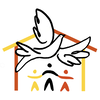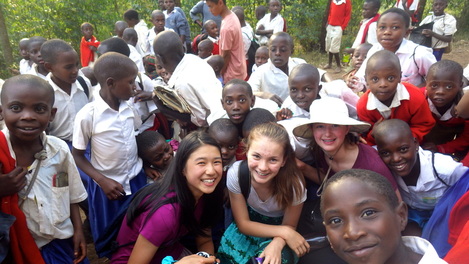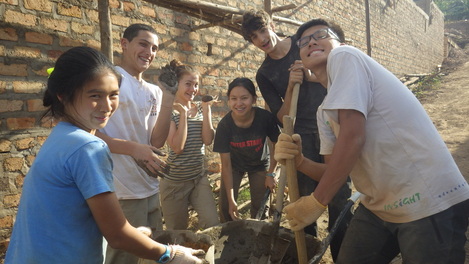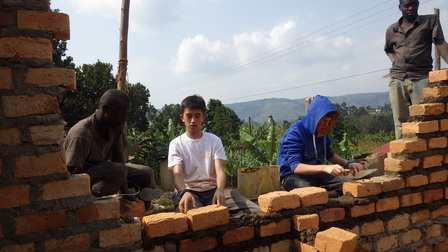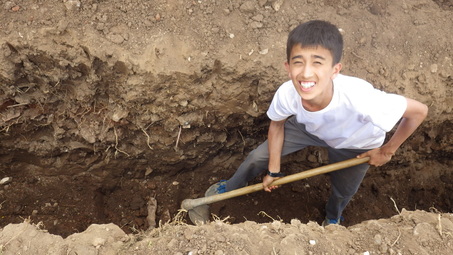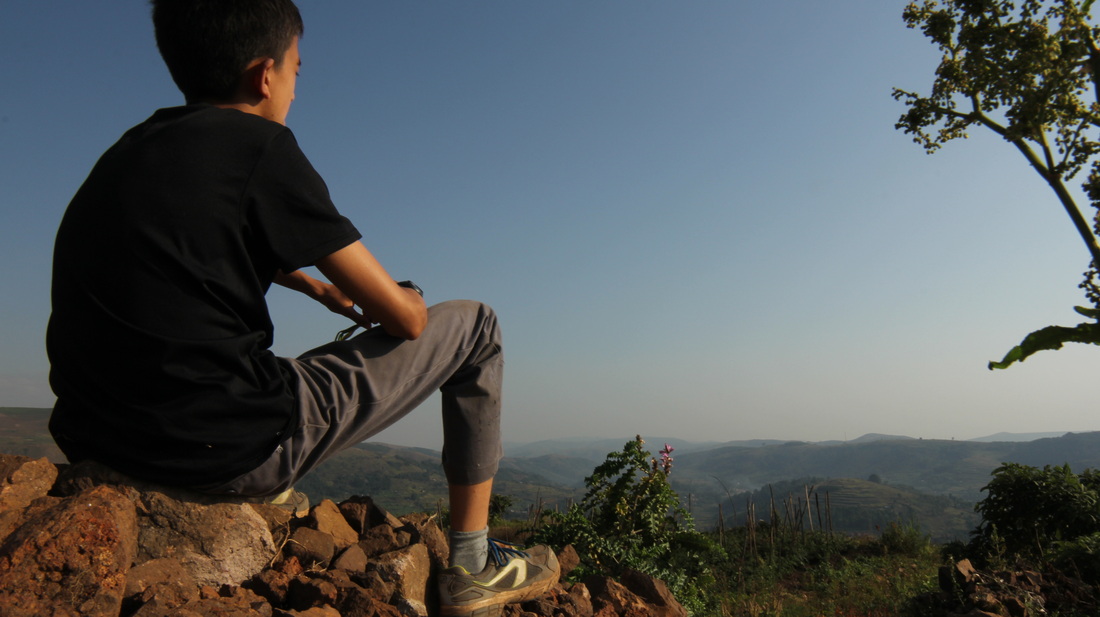Reflections on a Journey to Uganda
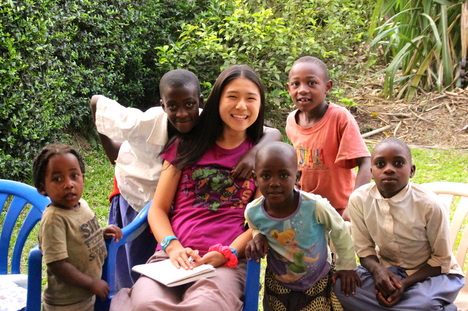
The Uganda trip was a life changing experience for me, for all nineteen of us, and hopefully also for the orphans who will eventually live in The Peace Centre.
Everyone who attends Dulwich College Shanghai is very lucky. We have good homes; we have a family who love us and provide the best education; we have amazing holidays and all the latest gadgets. Essentially, we want for nothing. This means that it is our duty, our responsibility to help others. But if we are honest, are we doing enough?
That is why I chose to go to Uganda. Because this was a trip that sought to provide for others what I have been blessed with, and I am so glad that I got to be a team member in this incredible journey.
Uganda became a part of my life. The people of Bukinda are all so kind and generous, and everyone is constantly smiling, yet so many need help. 7.2% of adult Ugandans have AIDs; 7.6% of children are orphans, half of whom were orphaned due to AIDs.
I didn't just want to be someone who donated money - I wanted to be someone who actually built the orphanage, and I wanted to be a family member for those poor children. I wanted to be fully immersed and to really get to know the people I was helping, to really understand them. The majority of charity work that goes on in schools seems to be about raising money and then sending it off, but this trip was different. Here we were not only doing fundraising, but we got to go on the trip too, and work as a team building the home for these kids. It was the whole process.
It was not just about money - it was much more than that. It was about getting involved, about being a part of a team that was taking action to make a difference. If charity is only about fundraising, what are we actually teaching people? That someone else can do the dirty work? If it's just about money, you are distant from the problem, safe. But is that enough? I didn't think so, and I wanted get to know the people that I would be helping. I wanted to know what they eat, where they sleep, what their jobs are like, how they fill their free time, because once I understand all that, I am in a position to build relationships with the community. I wanted to be able to empathise, and this trip allowed me to do just that.
I learnt a great deal from my time in Uganda, and most importantly I learnt the importance of helping others. This trip has made me realise that any individual can make a difference, no matter how small. It was incredibly heart-warming to me that, as we were working on the building project, passers-by would come up to us to say thank you. Some even joined in the work with us.
We have built a home that will care for up to 40 children who do not have a family, love or education, but our commitment does not end there. We want to build relationships and that is why we are going back this year, and then hopefully next year, and the year after that. The long-term nature of The Peace Centre is why I am so thrilled to be a part of this project. One of the highlights for me was seeing the smiles that lit up everyone's faces, and I am looking forward to seeing more of these, the smiles that can make a brighter tomorrow.
by Mao Nakano, 10CP
Everyone who attends Dulwich College Shanghai is very lucky. We have good homes; we have a family who love us and provide the best education; we have amazing holidays and all the latest gadgets. Essentially, we want for nothing. This means that it is our duty, our responsibility to help others. But if we are honest, are we doing enough?
That is why I chose to go to Uganda. Because this was a trip that sought to provide for others what I have been blessed with, and I am so glad that I got to be a team member in this incredible journey.
Uganda became a part of my life. The people of Bukinda are all so kind and generous, and everyone is constantly smiling, yet so many need help. 7.2% of adult Ugandans have AIDs; 7.6% of children are orphans, half of whom were orphaned due to AIDs.
I didn't just want to be someone who donated money - I wanted to be someone who actually built the orphanage, and I wanted to be a family member for those poor children. I wanted to be fully immersed and to really get to know the people I was helping, to really understand them. The majority of charity work that goes on in schools seems to be about raising money and then sending it off, but this trip was different. Here we were not only doing fundraising, but we got to go on the trip too, and work as a team building the home for these kids. It was the whole process.
It was not just about money - it was much more than that. It was about getting involved, about being a part of a team that was taking action to make a difference. If charity is only about fundraising, what are we actually teaching people? That someone else can do the dirty work? If it's just about money, you are distant from the problem, safe. But is that enough? I didn't think so, and I wanted get to know the people that I would be helping. I wanted to know what they eat, where they sleep, what their jobs are like, how they fill their free time, because once I understand all that, I am in a position to build relationships with the community. I wanted to be able to empathise, and this trip allowed me to do just that.
I learnt a great deal from my time in Uganda, and most importantly I learnt the importance of helping others. This trip has made me realise that any individual can make a difference, no matter how small. It was incredibly heart-warming to me that, as we were working on the building project, passers-by would come up to us to say thank you. Some even joined in the work with us.
We have built a home that will care for up to 40 children who do not have a family, love or education, but our commitment does not end there. We want to build relationships and that is why we are going back this year, and then hopefully next year, and the year after that. The long-term nature of The Peace Centre is why I am so thrilled to be a part of this project. One of the highlights for me was seeing the smiles that lit up everyone's faces, and I am looking forward to seeing more of these, the smiles that can make a brighter tomorrow.
by Mao Nakano, 10CP
Lessons Learnt Building an Orphanage in Bukinda, Southern Uganda
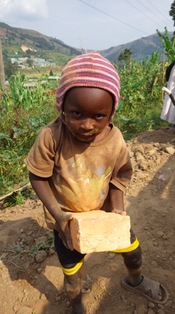
Over the last year I have been working with a team from Dulwich College Shanghai to raise money in order to build The Peace Centre, an orphanage for some forty of the millions of children that find themselves without parents due to the AIDS epidemic in Uganda. In June we travelled to Bukinda to work on the construction, and the trip did exactly what I hoped it would – it changed my life.
The entire experience was so interesting and taught me so many different things. Above all, I realised how important it is to help others and not just focus on my own life, to make sure, even if I don't make that big a difference, that I at least try to change the world for the better. This may sound corny but it is true, and I would like to share some reflections on four of the lessons that hit home during my three weeks in Bukinda, Uganda.
Lesson 1.
As an IB student, the pressure on narrowing your career path becomes more and more intense. Teachers always tell you to choose what makes you happy, but, if we are honest, most students don’t buy into this completely, myself included. Yes, you need to choose a job that makes you happy, but bearing in mind the expat community we are raised in, the primary thought is something that pays well: it’s money that makes you happy.
My outlook on this changed with the Uganda trip. Seeing children and adults alike constantly beaming with friendliness, despite having so little, taught me a great deal. Happiness doesn’t come from material belongings; it comes from people, relationships and community.
We worked hard every day, but one afternoon we had to put in a particularly tough shift lugging bricks across the building site. One of my favourite memories from the whole trip is when this tiny little boy, wearing a woolly hat in the scorching heat, walked next to me carrying half a brick as he wanted to lend a hand with our task, and he had a wonderfully cheery smile on his face as he did so. The warmth of his grin shattered my preconceived notion of money equating to happiness.
Lesson 2.
For the duration of our stay, the kindness shown towards us was extraordinary, and there was never the slightest bit of hesitation from anyone to help us. People gave up their beds for us and shared all that they owned with us, no matter how much or little that was. Everybody’s attitude towards us – all of whom were total strangers, at least at the beginning - was simply overwhelming. I saw love, care and generosity in a way that I had never experienced before, and I asked myself if I would give up my room and bed for someone I didn’t know. With all these wonderful displays of hospitality, it was hard not to become close to all the people we were working with, and it made me re-evaluate the importance of showing kindness and not just receiving people, but wholeheartedly welcoming them in to your community.
Lesson 3.
I worked out that we typically use somewhere between 100 and 200 litres of water a day. In Uganda, all the water that we used had either been collected in a tank from rainfall, or had to be collected from the local standpipe, where we had to wait in line as it trickled out of the tap. Going to collect 20 litres water took a huge amount of effort and as much as 30 minutes. It dawned on me how different that is to just running a tap and letting it flow.
I am lucky enough to have a wealth of heaters, air conditioning, light and many other things that make life comfortable. In Uganda, the power would regularly cut out, forcing us to reflect on how dependent we are on our seemingly never-ending supply of electricity in the western world. It was in living in Bukinda that I came to realise how lucky and how wasteful we are. After returning I challenged myself not to take a running tap or a nice warm shower for granted again.
Lesson 4.
In Uganda we worked hard every day at things that counted, at things that mattered and things that made a difference to the lives of others. Waking up didn’t feel like a chore, as we knew that what we were going to do that day was ultimately life changing, and not just for the orphans that will in due course live in The Peace Centre.
When I got back to Shanghai after three weeks in Uganda, I had long lie-ins, I watched movies, I played video games, I ate junk food and spent large amounts of time on my sofa. But I couldn’t help but feel depressed at this. My life had had purpose in Uganda, but what now? This lesson made me confront the cliché of ‘making every second count’ and caused me to reconsider how I spend my free time. It has made me, just like that little boy in the woolly hat, want to use my time to help others, and whether or not I have the opportunity to go back to Uganda next year, that is a powerful lesson I will always take with me.
by Dominic Pote, 12AA
The entire experience was so interesting and taught me so many different things. Above all, I realised how important it is to help others and not just focus on my own life, to make sure, even if I don't make that big a difference, that I at least try to change the world for the better. This may sound corny but it is true, and I would like to share some reflections on four of the lessons that hit home during my three weeks in Bukinda, Uganda.
Lesson 1.
As an IB student, the pressure on narrowing your career path becomes more and more intense. Teachers always tell you to choose what makes you happy, but, if we are honest, most students don’t buy into this completely, myself included. Yes, you need to choose a job that makes you happy, but bearing in mind the expat community we are raised in, the primary thought is something that pays well: it’s money that makes you happy.
My outlook on this changed with the Uganda trip. Seeing children and adults alike constantly beaming with friendliness, despite having so little, taught me a great deal. Happiness doesn’t come from material belongings; it comes from people, relationships and community.
We worked hard every day, but one afternoon we had to put in a particularly tough shift lugging bricks across the building site. One of my favourite memories from the whole trip is when this tiny little boy, wearing a woolly hat in the scorching heat, walked next to me carrying half a brick as he wanted to lend a hand with our task, and he had a wonderfully cheery smile on his face as he did so. The warmth of his grin shattered my preconceived notion of money equating to happiness.
Lesson 2.
For the duration of our stay, the kindness shown towards us was extraordinary, and there was never the slightest bit of hesitation from anyone to help us. People gave up their beds for us and shared all that they owned with us, no matter how much or little that was. Everybody’s attitude towards us – all of whom were total strangers, at least at the beginning - was simply overwhelming. I saw love, care and generosity in a way that I had never experienced before, and I asked myself if I would give up my room and bed for someone I didn’t know. With all these wonderful displays of hospitality, it was hard not to become close to all the people we were working with, and it made me re-evaluate the importance of showing kindness and not just receiving people, but wholeheartedly welcoming them in to your community.
Lesson 3.
I worked out that we typically use somewhere between 100 and 200 litres of water a day. In Uganda, all the water that we used had either been collected in a tank from rainfall, or had to be collected from the local standpipe, where we had to wait in line as it trickled out of the tap. Going to collect 20 litres water took a huge amount of effort and as much as 30 minutes. It dawned on me how different that is to just running a tap and letting it flow.
I am lucky enough to have a wealth of heaters, air conditioning, light and many other things that make life comfortable. In Uganda, the power would regularly cut out, forcing us to reflect on how dependent we are on our seemingly never-ending supply of electricity in the western world. It was in living in Bukinda that I came to realise how lucky and how wasteful we are. After returning I challenged myself not to take a running tap or a nice warm shower for granted again.
Lesson 4.
In Uganda we worked hard every day at things that counted, at things that mattered and things that made a difference to the lives of others. Waking up didn’t feel like a chore, as we knew that what we were going to do that day was ultimately life changing, and not just for the orphans that will in due course live in The Peace Centre.
When I got back to Shanghai after three weeks in Uganda, I had long lie-ins, I watched movies, I played video games, I ate junk food and spent large amounts of time on my sofa. But I couldn’t help but feel depressed at this. My life had had purpose in Uganda, but what now? This lesson made me confront the cliché of ‘making every second count’ and caused me to reconsider how I spend my free time. It has made me, just like that little boy in the woolly hat, want to use my time to help others, and whether or not I have the opportunity to go back to Uganda next year, that is a powerful lesson I will always take with me.
by Dominic Pote, 12AA
